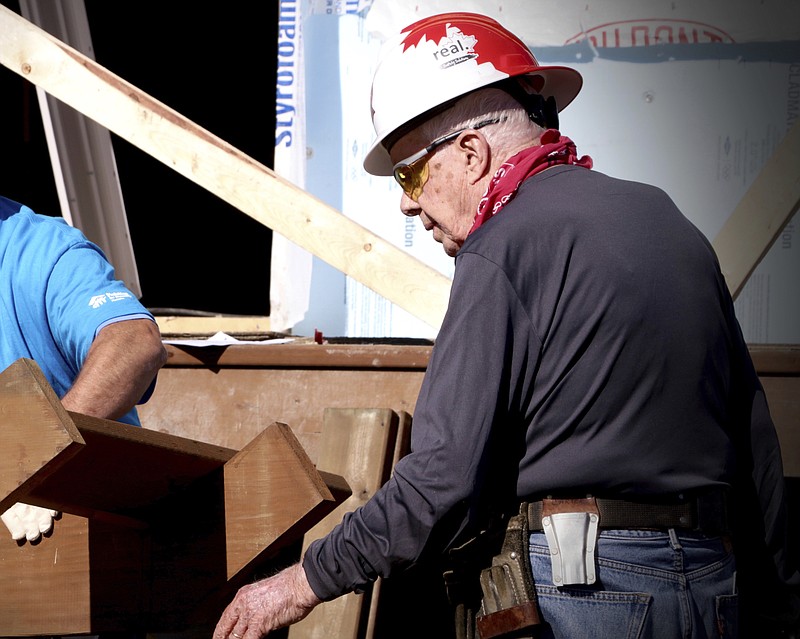Donald Trump has been president of the United States for six months, and several conservative pundits are already suggesting he might be the Republican Jimmy Carter.
Two of the pundits, Ross Douthat of The New York Times and Reihan Salam of National Review, made the observation the same month the president took office. David French, a senior writer for National Review and a senior fellow at the National Review Institute, made his last week.
To millennials, Carter is the onetime Democratic president who was in the news recently for collapsing at a Canada Habitat for Humanity work site, being hospitalized but returning to the site in a couple of days. They also may know him as the nonagenarian Georgian who beat what was supposed to be terminal cancer.
To those of a more vintage age, his one term, 1977-1981, was a perfect storm of catastrophe. It was punctuated by high unemployment, high inflation, an energy crisis, a hostage crisis in Iran and seeming timidity against an aggressive Soviet Union.
To be fair, he also oversaw the historic peace process between Egypt and Israel, but his inability to tame any of the aforementioned problems saw him suffer a landslide loss to Ronald Reagan in his re-election try.
Like Carter, Trump rode into office on what were felt to be the excesses of the previous occupant. For Trump, of course, it was Barack Obama, who had governed the country's center-right electorate from the far left with an executive pen. For Carter, it had been Richard Nixon, the twice-elected Republican who was felled by the hubris of the Watergate scandal (though Carter actually defeated Gerald Ford, who had ascended the the presidency upon Nixon's resignation).
With Carter, voters were looking for something different, for a breath of fresh air. The one-term Georgia governor, with his promise of "I'll never lie to you," his sassy mother, his harmless, beer-chugging brother, and his Southern Baptist sensibilities, seemed like a good choice. His Democratic primary opponent appeared to be cut out of the same, old Washington, D.C., mold.
Similarly with Trump, voters made it clear they didn't want another politician. The New York businessman and reality television host had never held public office but was clearly a success in his field. His Republican primary opponents were many and impressive but not what voters had in mind. They liked the guy who was brash, gave as good as he got from the media, promised them what was on their minds and vowed to "make America great again."
Carter went to Washington with his own agenda and attempted to force it down the throats of the Democrat-controlled United States Senate and House. They didn't care for it or for his rather holier-than-thou air, as he has grudgingly admitted since in several books.
Trump and his Republican-controlled Congress seemingly were on the same page - at least about what needed to be done: repeal and replace the Affordable Care Act, halt illegal immigration, reform the tax structure, cut regulations, stimulate growth. But the president is all over the board in his relationship with the Senate and the House. On various days, he proclaims via Twitter, they're for him, they're against him, they're moving too fast, they're moving too slow, they should do it this way, they should do it that way.
Douthat and Salam, according to French, focused on Carter's difficulty in keeping together divisions in his party (like his moderate wing vs. the liberal Ted Kennedy wing), the inference being that Trump must somehow unify the far right wing of the party with traditional Republicans before it's too late.
French's interpretation is that Trump, in his short span in office, is showing the signs that Carter did of being unable to competently handle the multitude of problems a president must face. His conclusion is that not getting it together will result in the same legacy Carter had - nearly three decades of moderate to center-right rule (including moderate Democrat Bill Clinton).
"Failed presidencies," he said, "have serious consequences."
Republicans under Reagan and two Bushes, he said, made 568 federal judicial appointments, including five justices of the Supreme Court. And, he said, it took voters years to trust Democrats on foreign policy.
We believe, as French acknowledged, it's still early for Trump. He made an excellent Supreme Court pick, he's rolled back onerous regulations, illegal immigration is down, and there are still opportunities for tax reform and perhaps health care reform. And to date, all the media dithering about Russia is just that - dithering.
Many of the voters who elected him still rock solidly back him. They want to see him to succeed on the issues he and they had in common. But everyone wants to see progress. Without it, we're not sure they're ready to vote in three decades of Democratic rule, but we're sure they're going to start thinking a little more carefully about whom they did send to Washington to represent them.
